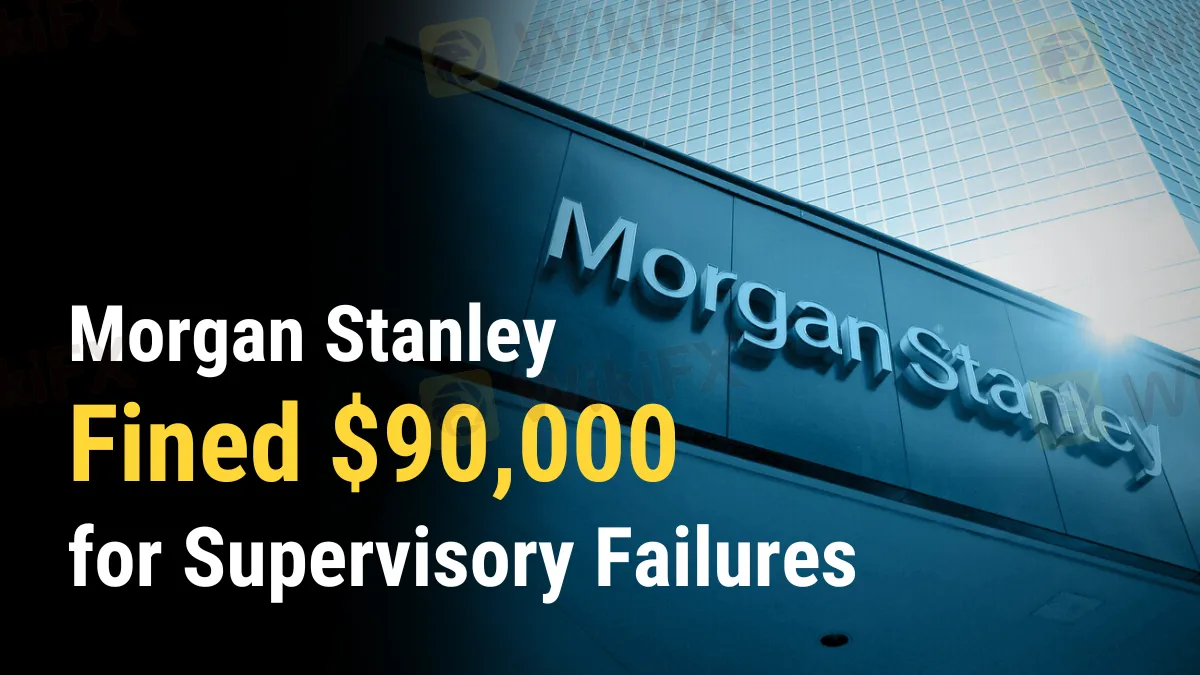简体中文
繁體中文
English
Pусский
日本語
ภาษาไทย
Tiếng Việt
Bahasa Indonesia
Español
हिन्दी
Filippiiniläinen
Français
Deutsch
Português
Türkçe
한국어
العربية
Morgan Stanley Fined $90,000 for Supervisory Failures
Abstract:Morgan Stanley was fined $90,000 for failing to supervise employee trading activities on NEX SEF, underscoring the importance of robust oversight in financial markets.

On April 17, 2024, the NEX SEF punished Morgan Stanley for its inability to effectively oversee a worker's trading actions on the platform from January to May 2021. The results showed that to move positions across his controlled Morgan Stanley accounts, the trader made self-matched transactions on the NEX SEF. The non-deliverable forward instruments traded in these deals were the Indian Rupee, Indonesian Rupiah, Korean Won, Malaysian Ringgit, and Taiwan Dollar.
Although Morgan Stanley received a warning from the NEX SEF on the dubious activity, its control and monitoring procedures proved to be inadequate in detecting and halting the ongoing self-matching transactions. The Panel concluded that the participant's failure to monitor the behavior of their employees and agents on the platform infringed under NEX SEF (legacy) Rule 407(h).
Morgan Stanley did not acknowledge or refute the factual findings or rule breaches in response to the disciplinary action. Nevertheless, they agreed to a settlement that included a monetary penalty of $90,000. This penalty serves as a poignant reminder of the paramount need for robust supervision and compliance protocols inside financial institutions.

The instance highlights how difficult it is for regulatory agencies to maintain market integrity and stop wrongdoing, especially when it comes to computerized trading. The intricate dynamics of financial markets require constant attention to detail from companies to prevent security lapses and preserve investor trust.
Other market players should take note of this disciplinary action against Morgan Stanley, which emphasizes the serious consequences of inadequate supervision. To identify and stop fraudulent activity and ultimately protect the integrity and stability of the financial markets, it highlights the vital role that efficient monitoring and surveillance systems play.
Investment in strong compliance infrastructure and training programs must be given top priority by financial institutions as regulatory scrutiny increases and technology continues to change trading practices. Mitigating operational risks and guaranteeing regulatory compliance need proactive steps to improve oversight and monitoring capabilities.
Finally, the financial sector should take note of Morgan Stanley's disciplinary action as a reminder of the need for strict oversight and compliance with legal requirements. Through the process of assiduously analyzing these occurrences, market players will be able to preserve the integrity of the world's financial markets and promote a transparent and accountable culture.

Disclaimer:
The views in this article only represent the author's personal views, and do not constitute investment advice on this platform. This platform does not guarantee the accuracy, completeness and timeliness of the information in the article, and will not be liable for any loss caused by the use of or reliance on the information in the article.
Read more

The Hidden Checklist: Five Unconventional Steps to Vet Your Broker
Forex broker scams continue to evolve, employing new tactics to appear credible and mislead unsuspecting traders. Identifying these fraudulent schemes requires vigilance and strategies beyond the usual advice. Here are five effective methods to help traders assess the legitimacy of a forex broker and avoid potential pitfalls.

Doo Financial Obtains Licenses in BVI and Cayman Islands
Doo Financial, a subsidiary of Singapore-based Doo Group, has expanded its regulatory footprint by securing new offshore licenses from the British Virgin Islands Financial Services Commission (BVI FSC) and the Cayman Islands Monetary Authority (CIMA).

CFI’s New Initiative Aims to Promote Transparency in Trading
A new programme has been launched by CFI to address the growing need for transparency and awareness in online trading. Named “Trading Transparency+: Empowering Awareness and Clarity in Trading,” the initiative seeks to combat misinformation and equip individuals with resources to evaluate whether trading aligns with their financial goals and circumstances.

Malaysian-Thai Fraud Syndicate Dismantled, Millions in Losses Reported
The Royal Malaysia Police (PDRM) has received 26 reports concerning the Nicshare and CommonApps investment schemes, both linked to a major fraudulent syndicate led by a Malaysian citizen. The syndicate’s activities came to light following the arrest of its leader by Thai authorities on 16 December.
WikiFX Broker
Latest News
ASIC Sues Binance Australia Derivatives for Misclassifying Retail Clients
WikiFX Review: Is FxPro Reliable?
Malaysian-Thai Fraud Syndicate Dismantled, Millions in Losses Reported
Trading frauds topped the list of scams in India- Report Reveals
AIMS Broker Review
The Hidden Checklist: Five Unconventional Steps to Vet Your Broker
YAMARKETS' Jingle Bells Christmas Offer!
Revolut Leads UK Neobanks in the Digital Banking Revolution
Fusion Markets: Safe Choice or Scam to Avoid?
SEC Approves Hashdex and Franklin Crypto ETFs on Nasdaq
Currency Calculator


